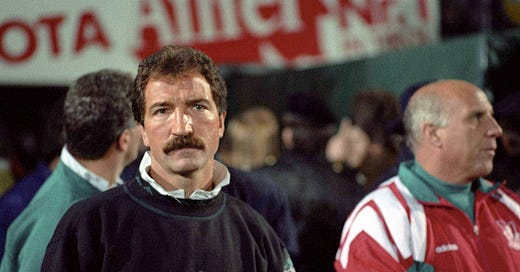A Quarter of a Century of Liverpool FC in the Premier League Era, 1992-2017, Part 1
Trading Places
This is the first instalment of a major new series on Dynasty. Originally a series of articles covering the period 1992 (the year football officially began in England!) to Klopp’s arrival in 2017, it was written by TTT Subscriber Anthony Stanley, serialised on The Tomkins Times and then published by TTT as a book called A BANQUET WITHOUT WINE - A Quarter-Century of Liverpool FC in the Premier League Era.
The book is available from https://www.amazon.co.uk/Banquet-Without-Wine-Quarter-Century-Liverpool/dp/1521850674. It remains a definitive matter of record of Liverpool FC during the period in question.
Looking back from our current vantage point, the world in 1992 – both footballing and in a larger sense – was at once familiar and strange. The toppling of the Berlin Wall had symbolically ushered in the end of Communism only a couple of years previously. A coalition of western and Arab countries, under the virtual hegemony of the United States, had launched Operation Desert Storm the previous year, forcing Saddam Hussein’s Iraq out of Kuwait. Nelson Mandela had recently been released from prison as the apartheid regime in South Africa was finally toppled. Bosnia – Herzegovina declared full independence and the Balkan Wars started in Eastern Europe, a harrowing conflict that would result in mass genocide and, eventually, UN intervention.
In the UK, the divisive reign of Margaret Thatcher had ended two years previously after mass demonstrations against the introduction of the hated Poll Tax, but political and social turmoil continued to rage, culminating in a three-day riot in Bristol a month before the inaugural Premier League season kicked off.
In the footballing arena too, it was a period of massive and rapid change. The Taylor Report, published in the aftermath of the horrific and tragic loss of life that was Hillsborough in April 1989, had recommended that all major stadia be converted to an all-seater model. Following this, in 1990, the Football League stipulated that all football grounds from the top two tiers of English football should be all-seater by August 1994.
1990 was also, of course, the year when a nation fell in love with football again, and it’s debatable whether the soon-to-be-seen garish razzmatazz of Sky Sports and its digital pay-per-view model would be the success it was if England hadn’t performed as they did and captured the hearts of the country. In particular, Paul Gascoigne, a genius of a footballer on his day but a vulnerable soul who struck a collective national chord of empathy, was possibly responsible more than anyone for the love affair that was about to begin between the sport and England. On a balmy night in Turin, his tears following a yellow card which would mean he would miss the World Cup Final if the Three Lions beat Germany entered a nation’s consciousness. As Gary Lineker – another hero who encapsulated all that appeared to be good about the domestic game – gestured to Bobby Robson, an icon was born and with it a new-found positivity and optimism in football. Even as Stuart Pearce skied his penalty and Robson – suddenly a beloved uncle figure – looked on with exquisite forlorn resignation etched on his face, the Thatcherite and grossly unfair portrayal of football fans as yobs and hooligans was firmly entering its death throes. Suddenly, it was cool to like football again.
If the formation of the Premier League was driven by the ‘bigger’ clubs wishing to procure greater financial rewards, the brassy Sky Sports was the fuel that ensured that the journey went further than anyone could have imagined. Satellite television guaranteed that the elite levels of the English game could be globalised; almost overnight, an insular and borderline myopic domestic game became a worldwide phenomenon, helped by the rapid strides in marketing and communication made possible by Sky and the corporation’s vast reservoirs of cash.
Unfortunately for Liverpool, the birth of the Premier League and its Faustian deal with Sky came at the worst possible time; just when an embracing of modernity and all of its unique challenges was required, the club found itself ill-equipped to deal with this brave new world. The twin calamities of Heysel and Hillsborough (in Paul Tomkins’ memorable phrase, “twin H-bombs”) had hit Liverpool very, very hard and essentially added to the decades-old philosophy of avoiding rather than embracing change.
The rest of this article is for Dynasty Subscribers only.
Keep reading with a 7-day free trial
Subscribe to Dynasty – The Tomkins Times to keep reading this post and get 7 days of free access to the full post archives.




